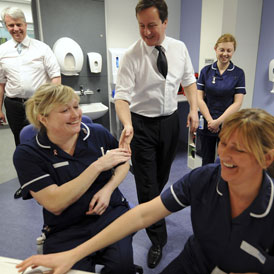Much-amended health bill to be amended again
With the health bill debated in the Lords, the government tables further amendments in the hope of preventing a Liberal Democrat rebellion. What changes are being made?

When the health white paper was published in July 2010, Health Secretary Andrew Lansley was blissfully unaware of the hurdles he would face in winning over doctors and nurses – and the Conservatives’ Lib Dem coalition partners.
In opposition, Mr Lansley’s party worked hard to convince the public that it could be trusted with the NHS. But an Ipsos Mori poll for the Health Service Journal puts Labour 18 points ahead of the Conservatives on health policy.
Mr Lansley wants a bigger role for the private and voluntary sectors in the health service and the poll offers him more comfort here, with 44 per cent of people agreeing that “as long as health services are free of charge, it doesn’t matter to me whether they are provided by the NHS or a private company” (as opposed to 41 per cent who disagree).
The passage through parliament of the health and social care bill was halted in 2011 because of the opposition building against the legislation.
Toxic
The NHS Future Forum was given the job of making the bill less toxic and it drew up a number of amendments that have gone through parliament.
This has failed to win over the unions and royal colleges representing health professionals. Those calling for the bill to be scrapped include the British Medical Association, the Royal College of GPs, the Royal College of Nursing, the Royal College of Midwives, the Faculty of Public Health and the Royal College of Paediatrics and Child Health.
The Royal College of Physicians, representing hospital doctors, is currently balloting its members for their views.
Some Lib Dem peers are particularly exercised about the bill’s emphasis on the need for competition and more private sector involvement in the health service.
Revolt
It was a revolt against the bill at the party’s 2011 spring conference that forced a review. The government, and Deputy Prime Minister Nick Clegg, the Lib Dem leader, want to avoid another clash at this week’s conference. That is why Health Minister Earl Howe has tabled further amendments for the debate on Tuesday.
The bill allows foundation hospitals to raise up to 49 per cent of their income from private patients, which the Royal College of Nursing believes will lead to longer waiting lists for NHS patients.
I would say this bill is a real dog’s breakfast. Rick Muir, IPPR
Earl Howe is proposing that safeguards are put in place, with NHS trust governors given a vote on plans to increase private income by more than 5 per cent.
Foundation trusts will have to set out every year how much they expect to earn from private sources, with the governors “satisfied that any plans for proposed increases in non-NHS income would not to any significant extent interfere with the foundation trust’s principal legal purpose to provide NHS services, or its other functions”.
Earl Howe said the government had “listened and sought wherever possible to address concerns” and that the amendments provided “further safeguards”.
The competition provisions in the bill have already been amended. The government originally proposed that the regulator Monitor would champion competition, with the power to impose sanctions to enforce competition law.
Due to fears about the commercialisation of the NHS, the government relented and agreed that Monitor’s primary duty should become the protection and promotion of patients’ interests. It was first proposed that competition would be opened up to “any willing provider”. This has become “any qualified provider”.
Health and Social Care Correspondent Victoria Macdonald looks at whether competition can be good for the NHS.
‘Dog’s breakfast’
Rick Muir, associate director for public service reform at the left-of-centre Institute for Public Policy Research, told Channel 4 News the bill had been so heavily amended that it was now a “mess”.
He said: “I would say this bill is a real dog’s breakfast. It’s been amended so many times and there have been so many changes that it is now completely incoherent. I disagreed with the original bill, but at least it was coherent.”
Mr Muir said Mr Lansley had been too ambitious when the bill was first drawn up. “The big mistake he made was to try to take a year zero approach to health reform, to say that in 2013 the health service will be a completely different organisation from the one that went before. The idea originally was that it would reduce bureaucracy, but if anything there is more bureaucracy now.”
Mr Muir said that allowing foundation trusts – which make up a significant minority of hospitals – to raise more money privately could affect NHS patients. “I would be worried that lifting the cap creates incentives for hospitals to prioritise private patients over NHS patients.”